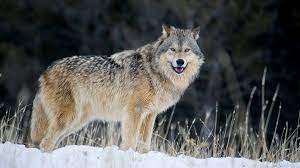The state’s wolf depredation compensation fund only received $350,000 in the 2024-25 budget.
Ranchers and producers are looking to recover losses they say have been caused by the wolf reintroduction program, submitting nearly $600,000 in claims.
Meeting the year-end deadline, three producers submitted six claims, totaling $582,000. That would more than bankrupt the state’s wolf depredation compensation fund, which received $350,000 in the 2024-25 budget. Over three years, the wolf reintroduction program has cost the state more than $5.1 million.
Between April and September, more than two dozen confirmed attacks on livestock in Jackson, Routt, and Grand counties drew only two paid claims through the state’s wolf depredation compensation fund. Those claims were small, with the largest paid claim of $1,514 for a calf in Jackson County. More are pending, with at least one waiting to be paid since last April, according to the state’s wolf depredation website.
Rep. Marc Catlin, R-Montrose, who sponsored the legislation, noted that livestock are highly bred and valuable. Ranchers have been working on their genetics for generations, he said Tuesday.
House Speaker Julie McCluskie, D-Dillon, was the other House sponsor. She said that while she hasn’t seen the claims, she said she trusts the process will be followed and the ranchers will be compensated. “Wolf reintroduction has been very challenging for our ranchers,” not just on depredation but the emotional toll it’s taken on producers as well. “The loss of livestock is not just dollars and cents. This is their livelihood, their family tradition. They have an attachment to these animals I’ve grown to appreciate.”
McCluskie said she’s grateful for the work done by CPW and the Department of Agriculture on conflict mitigation, including working to hire range riders.
But having the threat of depredation day after day is challenging for these families, McCluskie said. “I’ll be anxious to hear the outcome of these claims, yet honor the will of the voters. Reintroduction of wolves is here and I want to take the lessons learned to move toward coexistence in a way that honors our agricultural communities.”
She pledged to uphold the pledge from the 2020 ballot measure that calls for fair compensation to producers for depredations.
THE CLAIMS
The most significant claim is for more than $400,000 and is tied to more than just wolves killing livestock. The claim form allows producers to claim wolf impacts in other areas, including reduced weights and lower birth rates for calves. The claim states that this is caused by wolves causing stress on livestock.
The claim totaling $422,000 said wolves killed 27 calves and cows, and more than 100 went missing in 2024. In addition, more than 1,500 cows showed lower birth rates and less weight, making the livestock less valuable at sale. The first producer claimed cattle weighed 40 pounds less, which cost ranchers $193,000.
Claims for lost livestock do not allow compensation for every animal. Producers can claim a percentage of those lost animals, but how that is determined is unclear. The award percentages ranged from less than 50% to 75%.
The same producer lost 15 sheep to wolves in 2024. That claim totaled more than $15,000.
None of the claims identify the producers or the counties where they reside.
However, Colorado Politics confirmed the biggest claim is from Conway Farrell of Grand County, who has reported dozens of livestock lost to or killed by wolves in 2024.
Farrell told Colorado Politics that his cattle do not spread out in the pastures and are constantly stressed because they fear the wolves. They’re not seeking ground with fresh feed and will congregate together instead of scattering in the pasture. In some places, he said, cattle must be pushed to other areas after being scared by wolves.
The change in feeding habits has resulted in lower birth weights for the calves. When the cattle are taken to market, on average, they each weigh 40 pounds lighter than cattle from a year ago. Farrell said a neighbor experienced similar losses, with cattle weighing 29 pounds less on average.
He said wolves cost the Farrells almost $600,000 in 2024, including hunting losses of $140,000. That’s not a sustainable loss, he added.
The second producer submitted two claims totaling more than $100,000. The claims were for one dead calf, a necropsy, 57 lost livestock, and low conception rates for cows.
The third producer submitted two claims totaling $42,922 for one cow lost to a wolf and for lower conception and market weights.
It’s unlikely that this is the end of claims that will be submitted to Colorado Parks and Wildlife, according to the Middle Park Stockgrowers Association, which released the claim forms to the media on Tuesday.
Source: The Fence Post: View Complete Article











